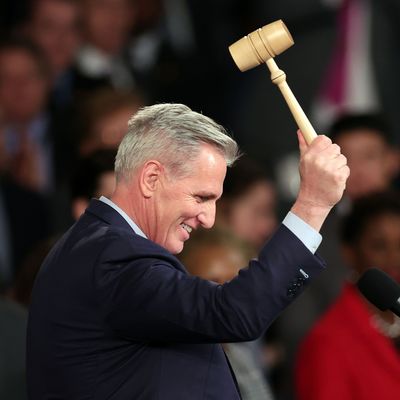
Anyone who watched the humiliating saga of Kevin McCarthy’s struggle to become House Speaker last week is probably aware that he and other “Establishment” Republicans lost a lot of face in order to coerce hard-core MAGA conservatives into allowing him to get the gavel. House members so marginal they were practically cartoon characters in the last Congress (e.g., Marjorie Taylor Greene, Lauren Boebert, and Matt Gaetz) walked tall on the floor of the people’s chamber, playing an outsize role in the drama.
The cringes of embarrassment from Republicans and snickers of Schadenfreude from Democrats will soon fade from memory. But the concessions McCarthy and his allies made to the rebels will have long-lasting consequences.
Some of these concessions will be incorporated into the new rules for the House that members are expected to vote on during the evening of January 9. Others are part of an until-now secret addendum that may or may not be fully disclosed by the time the rules are adopted. Either way, Monday’s rules vote will be perceived as a confirmation of the overall deal. Here, a breakdown of what exactly GOP leadership gave up to get McCarthy his gavel.
.
Symbolic concessions
McCarthy promised the rebels early and conspicuous House votes on a number of hot-button issues, including congressional-term limits and some sort of draconian border-control measures (that’s in addition to already planned votes on abortion and on rescinding appropriations for IRS agents). Such votes may be exciting for conservative “base” voters and their media outlets and embarrassing for members and candidates running in highly competitive or blue-leaning districts in 2024. But like any other House-initiated legislation in the 118th Congress, such votes don’t amount to a hill of beans in the real world since they can easily be blocked (or, more likely, just ignored) by the Democratic-controlled Senate and vetoed by Joe Biden in the extremely remote chance that any of them get through the upper chamber.
Similarly, there are rules and operations changes that play to the archconservative conceit that McCarthy is grudgingly opening up the House to “the people” and increasing accountability. But these changes, such as the relaxation of security restrictions on public attendance of House proceedings and the abolition of voting by proxy, don’t mean a lot substantively. They will make life harder and more dangerous for House members but don’t have any direct legislative significance.
Finally, there are concessions that simply sharpen and entrench moves that most Republicans already wanted, like the establishment of a Select Subcommittee on the Weaponization of the Federal Government to do a deep dive on GOP claims that the Obama and Biden administrations used federal agencies to persecute conservatives.
.
Concessions that matter only to Republicans
A lot of concessions that House Freedom Caucus members wanted very badly had to do with the internal power dynamics of the House Republican Conference and, more generally, the power of hard-core MAGA types in the GOP (whose stronghold is the House, as opposed to the RINO-riddled Senate).
The new jewel in the conservatives’ crown is a rules change restoring the right of any one House member to offer a “motion to vacate the chair” that can trigger what is in effect a no-confidence vote in the Speaker. If McCarthy faces and loses such a vote, then all that pain and struggle to win his gavel will be for naught. So this is a Sword of Damocles that will hang over his tenure, giving the former rebels a fresh chance to depose him whenever he displeases them.
There are additional concessions — not all of them public yet — that boost the relative power of the House Freedom Caucus and its leaders and members, including spots on the agenda-setting Rules Committee and other top committees, Appropriations Subcommittee chairmanships, and seats on the Steering and Policy Committee that approve all the other committee assignments.
A concession with unclear implications is McCarthy’s agreement to press for FY 2024 appropriations at levels no higher than FY 2022 spending. This is essentially an effort by HFC types to unravel the recent FY 2023 omnibus appropriations bill (often denounced during the Speaker’s election debate as the “$1.7 trillion monstrosity”) with its increases in both defense and nondefense spending. There has been a lot of angst among Republican defense hawks about this promise along with some MAGA talk about it being designed to reverse defense spending on behalf of Ukraine. The House cannot, of course, impose its will on the Senate or the White House. So the real question about this promise is how hard McCarthy pushes to keep it. The same is true of a promise to enact a budget resolution paving a path to a balanced federal budget over ten years, which will inevitably involve deep cuts to defense, Social Security, and Medicare, areas many Republicans are rightly wary to enter with pruning knives.
.
Concessions that endanger the whole country
A couple concessions are of urgent concern to the country as a whole precisely because they leave nothing to McCarthy’s discretion. Both involve spending issues where there is a vast gap between the House rebels who nearly derailed McCarthy and most Republican, as well as Democratic, members of Congress.
One compromise basically promised that the House would never pass an omnibus appropriations bill again, holding votes on 12 separate appropriations bills instead. The problem here is that Congress has routinely relied on omnibus bills in recent years not just to “hide” controversial spending items but because it has proved impossible to get separate bills through Congress by the end of each fiscal year. Last year, for example, six appropriations bills made it through the House and zero made it through the Senate. In effect, the House is now demanding that both chambers now do something they’ve been unable to do for decades. It’s a recipe for fiscal gridlock, government shutdowns, and, at best, a system in which the government chugs along on the power of “continuing resolutions” — stopgap spending bills that keep spending levels the same — which is likely what the MAGA conservatives want. So, ironically, instead of the deep and thoughtful review of federal spending the rebels claim to want, this promise will probably produce at least two years of keeping the federal government on automatic pilot when it comes to spending priorities.
Fiscal gridlock will become even more likely thanks to another McCarthy concession: opening up appropriations bills to amendments from any member. This virtually guarantees weeks, or even months, of posturing and demagoguery — from members of both parties, actually — on most, if not all, of the individual appropriations bills and, again, potentially insoluble conflicts with the Senate, which won’t undertake this nonsense.
But the problems associated with the appropriations process pale in comparison to the apparent (but still hazy) McCarthy promise to hold the impending debt-limit increase or suspension hostage to unspecified spending cuts. Unlike the limited damage associated with a government shutdown, even a brief debt default could produce a national and global economic calamity. And as my colleague Jonathan Chait pointed out, the odds of that happening have just gone up immeasurably:
In the current circumstances, a successful hostage release would be all but impossible. Imagine a Republican Speaker — any Republican Speaker — figuring out a ransom that almost the entire caucus could agree on. The intraparty dynamics virtually guarantee that anything a Republican leader could agree to would immediately be seen on the far right as too little.
And that’s where McCarthy’s concessions begin to interact: A single member determined to force otherwise impossible spending cuts could throw McCarthy’s Speakership into turmoil and doubt, making him willing to become even more reckless with respect to the debt limit than he already is.
All in all, the country could pay a very high price for McCarthy getting and keeping his gavel.
More on politics
- Trump vs. Biden Polls: Kennedy Now Threatens Both Candidates
- Was the Ukraine Aid Bill a Trump Defeat or a Strategic Retreat?
- Biden Was Right About Both Antisemitism and the Palestinians






























